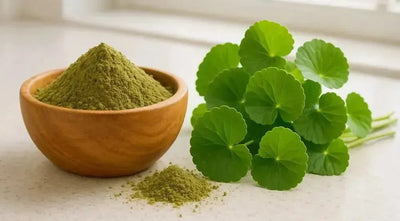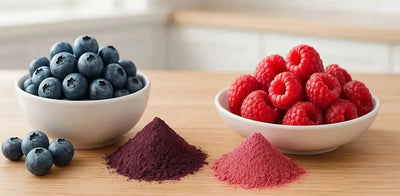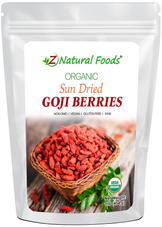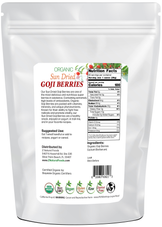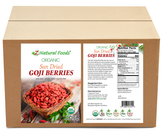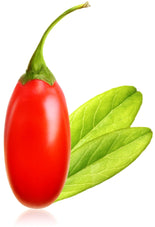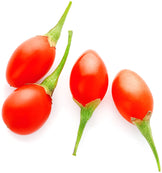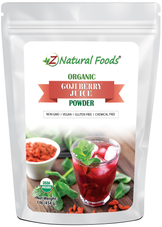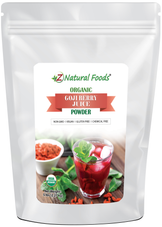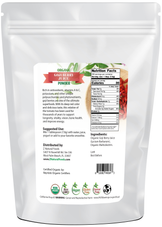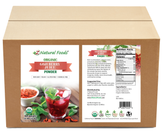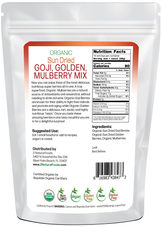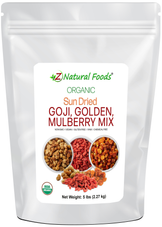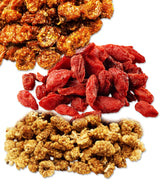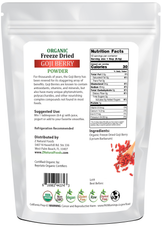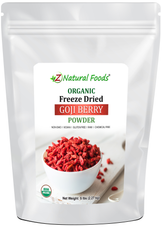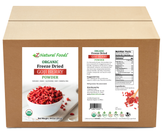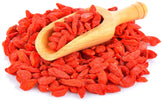Description
Description
A simple review of the similarities and differences between sun-dried goji berries, organic freeze-dried goji berry powder, organic goji berry juice powder, and goji berry extract powder
Goji berries, also known as wolfberries, have been used in traditional Chinese medicine and cuisine for over 2,000 years[5]. The berries come from two closely related species, Lycium barbarum and Lycium chinense, native to East Asia.
Scientifically, goji berries are rich in various compounds, including polysaccharides (LBPs), phenolic compounds, and vitamins[6]. Traditionally, they have been used in Chinese, Japanese, and Korean medicine, often prepared as decoctions, powders, or mixed with other herbs[3].
In traditional Chinese medicine, goji berries are considered a top tonic herb[7]. The berries have been incorporated into daily diets, consumed raw, as juice, or in teas[3] in a variety of formats, ranging from the whole berry, to powders and extracts.
Today, we review the differences between these ways you can enjoy goji berry products.
What is the difference between all the Goji Berry products?
Z Natural Foods provides four varieties of Goji Berry products, which include;
- Organic sun-dried goji berries
- Organic freeze-dried goji berry powder
- Organic goji berry juice powder
- Goji berry extract powder
Deciding which is best for you can seem like a daunting task. But not anymore. Here are the differences with a brief introduction of each product followed by a convenience list, under common categories that clearly explain for you:
Organic sun-dried goji berries are the whole fruits of Lycium barbarum or Lycium chinense that have been dried using traditional methods. This process involves exposing the fresh berries to sunlight for several days, allowing natural dehydration to occur.
Sun-drying is a low-cost method that preserves the berries for extended periods while concentrating their natural sugars and flavors.
Organic freeze-dried goji berry powder is produced by freezing whole organic goji berries and then removing the ice through sublimation under vacuum conditions. This process preserves the berry's structure and most of its nutritional content.
The resulting product is a fine powder that can be easily reconstituted or added to various food products.
Organic goji berry juice powder is typically made by first extracting juice from fresh goji berries, then spray-drying or freeze-drying the liquid to create a powder form.
This process concentrates the water-soluble components of the berries, potentially altering the nutritional profile compared to whole dried berries.
Goji berry extract powder is a more concentrated form of goji berry components, often focusing on specific compounds such as polysaccharides or flavonoids. The extraction process may involve using solvents or other methods to isolate particular constituents, followed by drying to create a powder form.
Seven main differences between sun-dried goji berries, organic freeze-dried goji berry powder, organic goji berry juice powder, and goji berry extract powder can be explained as follows:
1. Form and Processing:
- Organic sun-dried goji berries: Whole berries dried naturally in the sun[1].
- Organic freeze-dried goji berry powder: Whole berries frozen and moisture removed through sublimation[2].
- Organic goji berry juice powder: Juice extracted from berries, then spray-dried or freeze-dried[3].
- Goji berry extract powder: Specific compounds extracted from berries.
2. Concentration:
- Organic sun-dried goji berries: Least concentrated, retaining original berry structure[1].
- Organic freeze-dried goji berry powder: More concentrated than sun-dried, preserving most nutrients[2].
- Organic goji berry juice powder: Concentrated form of water-soluble components[3].
- Goji berry extract powder: Generally concentrated, focusing on specific compounds.
3. Composition:
- Organic sun-dried goji berries: Retain most of the whole fruit's components[1].
- Organic freeze-dried goji berry powder: Similar to whole berries but with moisture removed[2].
- Organic goji berry juice powder: Contains mainly water-soluble components[3].
- Goji berry extract powder: Focused on specific compounds, may lack some original berry components.
4. Usage:
- Organic sun-dried goji berries: Often eaten as snacks or added to foods[1].
- Organic freeze-dried goji berry powder: Versatile for adding to various foods and beverages[2].
- Organic goji berry juice powder: Easily mixed with liquids or added to recipes[3].
- Goji berry extract powder: Often used in supplements or cosmetic formulations.
5. Shelf Life:
- Organic sun-dried goji berries: Long shelf life due to low moisture content[1].
- Organic freeze-dried goji berry powder: Extended shelf life due to very low moisture content[2].
- Organic goji berry juice powder: Long shelf life when properly stored[3].
- Goji berry extract powder: Generally stable with a longer shelf life.
6. Taste and Texture:
- Organic sun-dried goji berries: Chewy texture with a slightly sweet and tart flavor[1].
- Organic freeze-dried goji berry powder: Fine powder, easily dissolves, retains original flavor[2].
- Organic goji berry juice powder: Fine powder, easily dissolves, concentrated flavor[3].
- Goji berry extract powder: May have a more intense or altered flavor profile.
7. Preservation of nutrients:
Freeze-drying is generally considered to preserve nutrients better than sun-drying, while extraction methods may focus on specific compounds at the expense of others.
It's important to note that the nutritional content and potential effects of goji berries may vary depending on their form and processing methods. Further research is needed to fully understand the implications of these differences.
For more information about each of these products and their product descriptions, visit:
- Organic sun-dried goji berries
- Organic freeze-dried goji berry powder
- Organic goji berry juice powder
- Goji berry extract powder
- Organic sun dried goji, golden, mulberry mix
References:
[1] "Goji Berry Powder - VehGro," VehGro Shop, accessed October 11, 2024, https://www.vehgroshop.com/blog/goji-berry-powder.html.
[2] Danica Ariana et al., "Health Benefits and Applications of Goji Berries in Functional Food Products Development: A Review," Foods 11, no. 4 (2022): 464, https://doi.org/10.3390/foods11040464.
[3] "Goji Berry Juice Powder - Organic," Z Natural Foods, accessed October 11, 2024, https://www.znaturalfoods.com/products/goji-berry-juice-powder-organic.
[4] Ma, Zheng Feei, Hongxia Zhang, Sue Siang Teh, Chee Lung Lim, Yutong Liu, Mehraj Ahmad, Yihe Zhang, et al. "Goji Berries as a Potential Natural Antioxidant Medicine: An Insight into Their Molecular Mechanisms of Action." Oxidative Medicine and Cellular Longevity 2019 (2019): 2437397. https://doi.org/10.1155/2019/2437397.
[5] Ariana, Danica, Eko Susanto, Andi Nur Faidah Rahman, Yusep Ikrawan, and Yana Cahyana. "Health Benefits and Applications of Goji Berries in Functional Food Products Development: A Review." Foods 11, no. 4 (2022): 464. https://doi.org/10.3390/foods11040464.
[6] Baumgartner, Stefan, and Jianhua Shao. "Process for Manufacture of Extract Containing Zeaxanthin and/or Its Esters." World Intellectual Property Organization Patent WO2013123618A1, filed February 22, 2012, and issued August 29, 2013. https://patents.google.com/patent/WO2013123618A1/en.
[7] Shahrajabian, Mohamad Hesam, Wenli Sun, and Qi Cheng. "Health benefits of wolfberry (Gou Qi Zi, Fructus barbarum L.) on the basis of ancient Chinese herbalism and Western modern medicine." Avicenna Journal of Phytomedicine 11, no. 2 (2021): 109-119.

